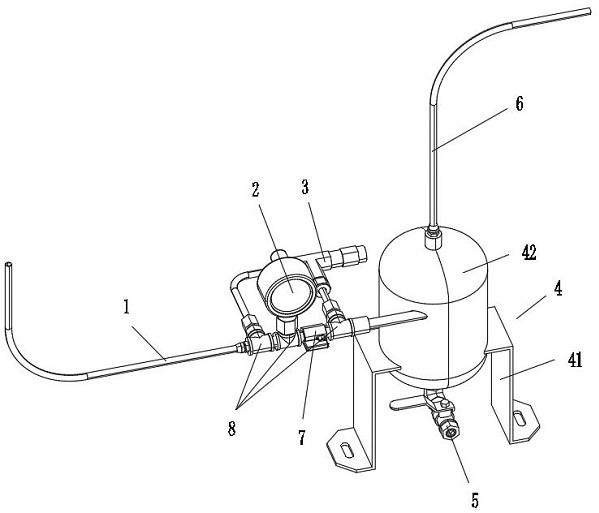2024/11/19 8:47:15
Resources
What are the effects of compressed air leaks
Compressed air leakage is a problem that cannot be
ignored in industrial production, and its influence is far-reaching and
multi-faceted. The following details the impact of compressed air leakage in
terms of energy waste, production efficiency, equipment life, environmental
pollution, and economic and safety risks.
First, energy waste
Compressed air leakage is one of the major sources
of energy waste in the industrial sector. According to relevant statistics, the
leakage in domestic factories usually accounts for 20%-40% of the gas supply,
which is an astonishing proportion. Every minute of leakage results in a
significant amount of wasted energy, as the compressor needs to be constantly
running to replenish the leaking compressed air. This waste of energy not only
increases the operating costs of enterprises, but also creates an unnecessary
burden on the environment. In addition, the leaked compressed air itself is
also a waste of resources, especially in today's energy shortage, this waste is
particularly undesirable.
Second, the production efficiency is reduced
Compressed air leakage can directly affect
production efficiency. First, leaks can cause a drop in system pressure, which
in turn affects the function and efficiency of pneumatic equipment. For
example, the injection force of the nozzle, the execution force of the
cylinder, and the action speed will be reduced by the impact of the system
pressure drop. In order to maintain the normal production rhythm, enterprises
often have to increase the gas supply pressure of the system, but this will
further increase the energy consumption and operating burden of air
compressors. In addition, the leak may also lead to equipment failure,
dysfunctional and other problems, and even lead to the shutdown of the
production line, which will bring huge economic losses to the enterprise.
Third, the equipment life is shortened
Compressed air leakage can also cause damage to
equipment and shorten its service life. Leaking compressed air creates noise
and vibration during its flow, which can cause additional load and wear on
equipment. In the long run, the performance of the equipment will gradually
decline, and the failure rate will increase. At the same time, problems such as
unstable system pressure and overheating of equipment caused by leakage will
also accelerate the aging and damage of equipment. This will not only increase the
maintenance costs of enterprises, but also affect the stability and reliability
of the production line.
Four, Environmental pollution
Compressed air leakage also causes pollution to the
environment. The leaked compressed air may contain harmful substances such as
oil, moisture and impurities, which, if discharged directly into the
environment, will cause pollution to the atmosphere and water. In addition, the
noise and vibration generated by the leak can also have a negative impact on
the surrounding environment, affecting the physical and mental health of
employees and work efficiency. Therefore, compressed air leakage is not only an
economic problem, but also an environmental problem.
Five, Economic and security risks
From an economic point of view, compressed air
leakage will lead to an increase in business operating costs and a decrease in
profits. On the one hand, the energy waste and equipment damage caused by
leakage will increase the maintenance and operating costs of enterprises; On
the other hand, the loss of production efficiency and downtime caused by
leakage will also directly affect the economic benefits of enterprises. In
addition, the leak may also cause security accidents, such as equipment
explosion, fire, etc., which will bring huge economic losses and reputation
damage to enterprises. Therefore, compressed air leakage is an economic and
safety risk that cannot be ignored.
Six, Response measures
In response to the compressed air leakage problem,
enterprises should take the following measures:
1. Regular inspection and maintenance: Regular
inspection and maintenance of the compressed air system, timely discovery and
repair of air leakage points. At the same time, the pipe network is cleaned and
maintained to eliminate dead corners and corrosion in the pipe network.
2. Improve employee awareness: strengthen employee
training and education to improve employees' awareness and attention to
compressed air leakage. Encourage employees to participate in energy
conservation and emission reduction work, and clarify the division of
responsibilities and reward and punishment mechanisms.
3. Use efficient equipment: Use efficient and
energy-saving air compressors and pneumatic equipment to reduce energy waste
and equipment damage. At the same time, optimize the system design layout and
pipeline direction to reduce the risk of leakage.
4. Implement scientific management: Establish and
improve the compressed air leakage management system and process specifications
to reduce leakage problems caused by human factors. At the same time, advanced
technical means such as intelligent monitoring system are used for real-time
monitoring and early warning of compressed air system and timely detection and
handling of leakage problems.
To sum up, the impact of compressed air leakage on
industrial production is multifaceted and far-reaching. Enterprises should take
effective measures to reduce leakage problems from multiple perspectives to
ensure production efficiency and equipment life, reduce operating costs and
protect the environment.
